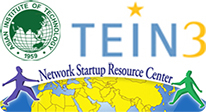Workshop Presentations and Lab Materials
Instructors
(Tentative)
- Hervey Allen, Network Startup Resource Center
- Greg Shepherd, Cisco Systems
- Dale Smith, University of Oregon Network Services
- Carlos Vicente, University of Oregon Network Services
Time Schedule
(Tentative)
| Schedule | |
| Session I | 0830-1030 |
| Break | 1030-1100 |
| Session II | 1100-1300 |
| Lunch | 1300-1400 |
| Session III | 1400-1600 |
| Break | 1600-1630 |
| Session IV | 1630-1800 |
Monday
(Linked materials to be updated)
Campus Network Design Principles/Physical? Cabling Infrastructure
0830-0900: Welcome
0900-1030 Introduction to Campus Network Design (Dale Smith): [PDF | PowerPoint (12.6MB)]
What are we trying to solve?
- Network design goals
- Reliability
- Resiliency
- Manageability
- Scalability
- Layering
- Complexity versus simplicity
- Difficult balance between growth, capacity, resilience versus simplicity
1030-1100: Coffee/Tea? Break
1100-1300 Physical Cabling Infrastructure (Dale Smith ): [http://nsrc.org/workshops/2010/kenet-nsrc/raw-attachment/wiki/WorkshopFile/monday_cabling.ppt PowerPoint
- Fiber Optic Systems
- Physics of Fiber Optic Cable
- Cable types
- Copper cabling systems
1300-1400: Lunch
1400-1500: REN Service Models (Dale Smith) http://ns.uoregon.edu/~dsmith/talks/1%20-%202009%20AfNOG%20Tutorial%20REN%20Service%20Models.ppt PowerPoint
- What is a REN
- Why a REN
- Varieties of RENs
- Most Successful RENs
- Non-Network Based RENs
- Network Based RENs
- REN as an ISP
- REN as a Peering Network
- What model of NREN will you use?
1500-1600: IP and ASN Requirements (Dale Smith) http://ns.uoregon.edu/~dsmith/talks/2%20-%202009%20AfNOG%20Tutorial%20IP%20and%20ASN%20requirements.ppt PowerPoint
- To NAT or not to NAT
- Public IP Addresses
- Provider Independent IP Addresses
- Autonomous System Numbers
- How Much IP Address Space
- For NRENs
- For Campus neworks
- NREN IP Addressing
- Simple Small REN Example
- Campus Network IP Addressing
- Simple Small Campus Example
1600-1630: Coffee/Tea? Break
1630-1800: NREN Roundtable Discusion
- Participants will discuss and share the state of current NRENs in their regions.
Tuesday
Layer 2 in-building design + lab
0830-1030: In-building Network Design [http://nsrc.org/workshops/2010/kenet-nsrc/raw-attachment/wiki/WorkshopFile/layer2-network-design.ppt PowerPoint
Best practices in Campus Network Design
- Switch versus Hub versus Router
- Switching Architectures (star topologies - aggregation switch serves edge switch)
- Virtual LANs (VLANs)
- Increases complexity
- Not necessarily a security mechanism. Don't confuse VLANs with host or data base security
- Don't build VLAN spaghetti
- Examples of where we recommend VLANs
- Technology and practical hints
- Tagging and untagged
- Trunking
- Q in Q
1030-1100: Coffee/Tea? Break
1100-1300: Best Practices continued
- Spanning Tree Protocol (STP)
- 802.d
- 802.1w
- 802.1s
- Selecting appropriate switches
- class="lroman"> Must be managed
- SNMP, SSH, access control techniques
- Fault Tolerance
- Port bundling
- Spanning tree (using loops to your advantage)
- Network Management
- Switching and security considerations
- Rogue DHCP server prevention
- How does it work
- Uplink/downlink configuration
- Dynamic ARP inspection
- 802.1x/network access control
- Rogue DHCP server prevention
1300-1400: Lunch
1400-1600: Afternoon Lab [http://nsrc.org/workshops/2010/kenet-nsrc/raw-attachment/wiki/WorkshopFile/intra-building-lab.doc Word http://nsrc.org/workshops/2010/kenet-nsrc/raw-attachment/wiki/WorkshopFile/intra-building-lab-appendix.txt 'Reference Sheet'
- 4-6 groups with 5 or 6 switches per group
- Build layer 2 network consisting of aggregation switch and edge switches
- Configure spanning tree across fabric
- What kind of spanning tree to configure?
- How to make different types inter-operate
1600-1630: Coffee/Tea? Break
1630-1800: Afternoon Lab continued
- Configure Rogue DHCP prevention
- Add 2nd aggregation switch to provide redundancy
- Why did that happen?
- Growing your network
- Use aggregation
- If you can't...
- VLANs
- Introducing and distributing VLANs
Wednesday
Layer 3 campus routing + lab
0830-1030: Campus routing infrastructure - Layer 3 [http://nsrc.org/workshops/2010/kenet-nsrc/raw-attachment/wiki/WorkshopFile/03_Core_Network_Design_v2.ppt PowerPoint
- Routing Architectures
- Where to route?
- High Availability and Fast Convergence
1030-1100: Coffee/Tea? Break
1100-1300: Campus Routing Protocols [http://nsrc.org/workshops/2010/kenet-nsrc/raw-attachment/wiki/WorkshopFile/03_Introduction_to_OSPF_v2.ppt PowerPoint
- Interior Routing Protocols (IGP)
- OSPF
- Exterior Routing Protocols (EGP)
- Routing Protocols and security considerations
1300-1400: Lunch
1400-1600: Lab exercises [http://nsrc.org/workshops/2010/kenet-nsrc/raw-attachment/wiki/WorkshopFile/Layer%203%20%E2%80%93%20Exercises.doc Word
- Configure router to serve both VLANs on your Layer 2 network
- Configure your router to have routes to your neighbors
- Dynamic versus static
- Configure OSPF
- Build dual core routed network
- Configure First Hop redundancy with HSRP
1600-1630: Coffee/Tea? Break
1630-1800: Lab exercises continued
Thursday
National and Regional REN Interconnection Strategies (BGP) + lab
0830-1300 Border Network Functions_ http://nsrc.org/workshops/2009/summer/presentations/day4/08_bgp_english.pdf PDF
- Border Router
- Border Routing functions
- Routing Protocols
- Routing Policy definitions
- Security
- ACLs
- NAT
1300-1400: Lunch
1400-1800: Lab Exercises
- BGP Lab: http://nsrc.org/workshops/2009/summer/presentations/day4/Layer_3_exercises.pdf PDF
- BGP Reference: http://nsrc.org/workshops/2009/summer/presentations/day4/bgp_reference.pdf PDF
Friday
Network Monitoring and Management + lab
0830-1030: Network Management (Hervey Allen): [PDF | PowerPoint]
- Overview:
- The big picture
- The NOC (Network Operations Center)
- Types of tools
1030-1100: Coffee/Tea? Break
1100-1145: SNMP Core Concepts
1145-1300: Cacti
1300-1400: Lunch
1400-1600: Nagios
1600-1630: Coffee/Tea? Break
1630-1800: Nagios Lab
Saturday
Network Monitoring and Mangement + lab
0830-1030: NFSen/Netflow
1030-1100: Coffee/Tea? Break
1100-1300: NFSen/Netflow Lab
1300-1400: Lunch
1400-1500: Tying it All Together: The NOC
1500-1600: Security Best Practices
1600-1630: Coffee/Tea? Break
1630-1730: Conclusion, Q&A, Exam, Certificates
